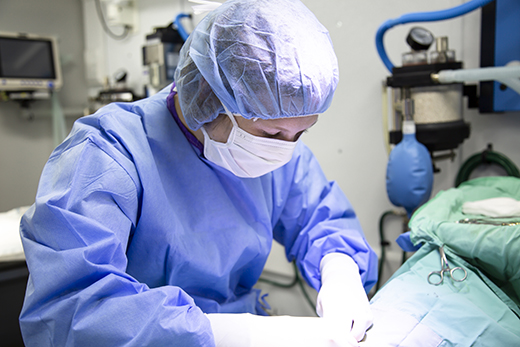College of Veterinary Medicine's shelter medicine program partners with the T. Russell Reitz Animal Shelter to increase Manhattan area service
Tuesday, Feb. 26, 2019

A Kansas State University veterinary student performs a surgical procedure in the shelter medicine program’s mobile surgery unit during a stop at a shelter in Beatrice, Nebraska, last summer. | Download this photo.
MANHATTAN — A new partnership will enhance the care and welfare of shelter animals in Manhattan while providing more educational opportunities for veterinary students. The shelter medicine program at the Kansas State University College of Veterinary Medicine has teamed up to help enhance and expand medical capabilities at the T. Russell Reitz Animal Shelter.
According to Brad Crauer, assistant professor of clinical sciences, the shelter medicine program has completed more than 16,000 surgeries for more than 20 partner organizations since its start in 2015.
"Through the partnership at the T. Russell Reitz Animal Shelter, we believe there is significant opportunity to help the shelter save more lives and improve the level of care provided," Crauer said. "Students will get regular, firsthand surgical and medical experience locally."
Deborah Watkins, director of animal services for the city of Manhattan, said the animal shelter placed 1,398 animals in 2018. She is optimistic that number will grow with increased involvement from the university.
"Our mission at the shelter is to return pets to their owners and rehome homeless pets," Watkins said. "Partnering with K-State students will increase the level of quality care for homeless animals to be ready for adoption."
Bonnie Rush, interim dean of the College of Veterinary Medicine, also acknowledge the benefits the partnership would bring to both pets in the community and the students.
"Our goal is to enhance the health and adoptability of each animal we encounter through the shelter medicine program," Rush said. "Occasionally, there are relatively inexpensive interventions — beyond spay/neuter — that will improve the likelihood of adoption. True to our motto, 'Future Vets Helping Future Pets,' senior veterinary students appreciate the opportunity to strengthen their skills. Even more so, they appreciate using their skills to improve the lives of unwanted and abandoned pets."
The university's shelter medicine mobile surgery unit, which is currently outreach-based, visits regional animal shelters to provide spay/neuter and medical triage service on-site. While the mobile surgery unit is only able to visit any given shelter once per week, the partnership with the T. Russell Reitz Animal Shelter will allow an opportunity for Kansas State University to have a day-to-day presence and increase the overall level of animal welfare in the Manhattan community.
Crauer said the partnership will occur in two phases. Initially, the mobile surgery unit will be stationed at the animal shelter on a weekly basis. Students will perform surgical services and address any medical cases during these visits, including exam and diagnostic- and therapeutic-plan development and implementation. Faculty from the university also will work with shelter leadership to develop best practices and standard operating procedures.
The second phase promotes a more consistent Kansas State University presence at the T. Russell Reitz Animal Shelter by utilizing the shelter medicine intern for at least one additional day each week for medical, surgical and operational expertise.
Additionally, the shelter is in the process of building a surgery suite that can also serve as a fully functioning dental unit. The suite would allow the mobile surgery unit to be deployed elsewhere while students, interns and faculty could operate at a high level on-site. The intention is to expand capabilities at the shelter beyond what can be provided on the mobile surgery unit. However, funding is still needed to complete the surgical suite.
"The city of Manhattan and the T. Russell Reitz Animal Shelter are very pleased to partner with the Kansas State Veterinary shelter medicine program," said Eddie Eastes, director of Manhattan Parks and Recreation. "This partnership will help the animal shelter fulfill its mission to protect public health through the sheltering of homeless companion animals and promote humane treatment and responsible pet ownership. We are confident this partnership will benefit the community by ensuring animals at the shelter have the best care possible as we help reintroduce them into the community through our adoption program."
